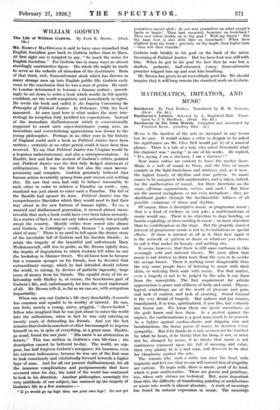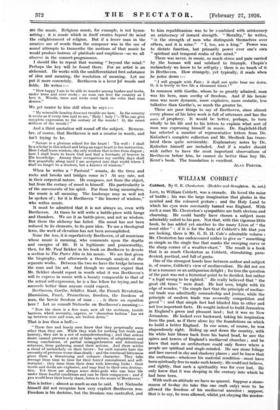MATHEMATICS, IMITATION, AND MUSIC
Beethoven. By Paul Bekker. Translated by M. M. Bozman. (Dent. 10s. 6d.)
Beethoven's Letters.- Selected by A. Eaglefield-Bull. Trans- lated by J. S. Shedlock. (Dent. -10s. 6d.)
Music is the hardest of the arts to interpret in any terms but its own. It would reduce a critic to despair to be asked the significance (as Mr. Clive Bell would put it) of a musical phrase. There is a tale of a lady who asked Stravinski what the clarionet was " saying " in one of his works. He replied, " It's saying I am a elarionet, I am a clarionet ! "
Now many critics are content to leave the matter there. Music is a web of sound to them, and the bliss of music consists in the light-footedness and intricacy and, as it were, the logical beauty of rhythm and tone pattern. So music comes to he compared with mathematics, and is taken, indeed, for the mathematics of sound. Are there directions on the score, affeluoso, appassionato, serioso. and such ? But these are the merest metaphors, or not even metaphors ; they are shorthand guides through the inexhaustible fullness of all possible variations of stress and rhythm.
Of course, there is descriptive music, or programme music ; that is a kind of trickery or vast joke, a mathematician of music would say. There is no objection to dogs howling, or bombs exploding, or trees rustling in music ; no more objection than to ventriloquism on the stage. But the properly musical interest of programme music is not in its imitations or special -effects. If there is interest at all in it, then here again it is the network or pattern or dance or whatever you choose to call it that makes its beauty, and nothing else.
It seems, however, that there is still some confusion in this seemingly cold and rational theory. We must allow that music is not written to draw tears from the eyes or to soothe the savage breast. There is nothing more disagreeable than the way some people have of listening to music with their skins, or watering their souls with music. For that matter, even a tragedy is not to be judged by the sobs it can draw from the susceptible. The first requirement for artistic appreciation is peace and stillness of body and mind. Physio- logical scratchings are of the world of pleasure and pain, and- lack of control, and lack of meaning. Grand Guignol is the very denial of tragedy. But sadness and joy remain, transfigured, it is true, spiritualized, if you like, but certainly not frozen out. We know them sub specie aelernitalis, as the gods know and love them. As a protest against the orgiast, the mathematician is a good man, much to be praised. As a fighter against cuckoo-shouts and dripping rain and bombinations, the hocus pocus of music, he deserves every sympathy. But if he thinks he is not, or must not be, touched by what he hears, if he thinkrthat his being is not, or must not be, changed by music, if he thinks that music is nit - continuous comment upon life, full of meaning and value, then very plainly he is a bad man, and deserves to be shot
for blasphemy against the arts. The reasons why such a critic can raise his head with .impunity and feel sure that no one will convict him of stupidity -are various. To begin with, there is music, good of its kind, which is pure mathematics. There are poems and paintings, too, whose only virtues are technical. But, more important than this, the difficulty of transferring painting or architecture or music into words is almost absolute. A train of meanings has found its natural expression in music. The meanings are the music. Religious music, for example, is not hymn-
setting : it is music which in itself creates beyond the mind the enlightenment of religion. But if a lesser man in the creative use of words than the composer was in the use of sound attempts to transcribe the motions of that music he would produce horrors of platitude and emptiness—as we all observe in the concert-programmes.
I should like to repeat that warning " beyond the mind."
Perhaps the key will be found there. For an artist is an alchemist. He works with the undifferentiated first substance of idea and meaning, the resolution of meaning. Let me .put it more concretely. Beethoven is a lover of woods and fields. He writes :-
" How happy I am to be able to wander among bushes and herbs, under trees and over rocks ; no man can love the country as I love it. Woods, trees and rocks send back the echo that man desires."
We get nearer to him still when he says :— " My miserable hearing does not trouble me here. In the country it seems as if every tree said to me, Holy ! holy '—Who can give complete expression to the ecstasy of the woods 1 0, the sweet stillness of the woods 1"
And a third quotation will round off the subject. Remem- ber, of course, that Beethoven is not a creator in words, and isn't trying to be.
" Nature is a glorious school for the heart ! 'Tis well : I shall be a scholar in this school and bring an eager heart to her instruction. Here I shall learn wisdom, the only wisdom that is free from disgust ; here I shall learn to know God and find a foretaste of heaven in His knowledge. Among these occupations my earthly days shall flow peacefully along until I am accepted into that world where I shall no longer be a student, but a knower of wisdom."
When he writes a " Pastoral " sonata, do the trees and rocks and brooks and bridges come in ? At any rate, not in their corporeal nature. He composes, not from the object, but from the ecstasy of mood in himself. His particularity is of the movements of his spirit. Far from being meaningless, the music is all meaning. The landscape may as well not be spoken of ; for it is Beethoven " the knower of wisdom," who writes music.
It must be admitted that it is not always so, even with Beethoven. At times he will write a battle-piece with bangs and thunders. We see it as battle-piece, and not as wisdom. But there the alchemy has failed. His mood has not been reduced to its elements, to its pure idea. To use a theological term, the work of elevation has not been accomplished.
None the less, it is superlatively Beethoven, of all musicians whose music is meaning, who comments upon the depths and energies of life. It is legitimate and praiseworthy,
then, for Mr. Paul Bekker in his hook on Beethoven to devote a section to The Poetic Idea in his music. We are first given the biography, and afterwards a thorough analysis of the separate works. Between the two we have the bridge between
the man and his art. And though we cannot expect that Mr. Bekker should report in words what it was Beethoven's will to express in music with a beauty comparable to that of the actual self-expression, he is a fine fellow for trying, and he succeeds better than anyone could expect.
. Beethoven, Goethe, Schiller, Kant, the French Revolution, Illuminism, Faust, Prometheus, freedom, the freedom of man, the heroic freedom of man . . . is there an equation here ? Let us consult Nietzsche on Beethoven's meaning :—
" Now the slave is a free man, now all the stubborn, hostile barriers, which necessity, caprice, or shameless fashion' has set up between man and man, are broken dowri."
That is less thrill a half
" These free and lonely men know that they perpetually seem other than they are. While they wish for nothing but truth and honesty, they are in a net of misunderstanding ; and that ardent desire cannot prevent a mist of false opinions, of adaptations and wrong conclusions, of partial misapprehension and intentional reticence, from gathering round their actions. And theie settles a cloild of 'melancholy on their brows : for such "natures hate the necessity of pretence worse than death : and the continual bitterness gives them a threatening and volcanic character. They take revenge from time to. time for their forced concealment and self - restraint : they issue from their dens with lowering looks : their 'words and "deeds are eXplosive; and may lead to their own destruc- tion. Yet there• are always some • demi-gods who can bear life under these fearful conditions and can be their conquerors : and if you would hear their lonely chant, listen to the music of Beethoven."
This is-better ; almost as much as can be said. Yet Nietzsche himself did not recognize how .very explicit -Beethoven. was. Freedom is his doctrine, but the freedom was controlled, and to him republicanism was to be combined with aristocracy an aristocracy 'of inward strength. " Morality," he writes, is the strength of men who distinguish theniselves over others, and it is mine." " I, too, am a king." Power was to dictate function, but primarily power over one's own ," spiritual and temporal realm of the mind."
There was never, in music, so much stress and pain carried by the - human will and subdued to triumph. Chopin's melancholy we know to be self-pity ; there is no touch of it in Beethoven. How strangely, yet typically, it reads when :he _potes down :- ".I will grapple with Fate ; it shall. not quite bear me down.
0, it is lovely to live life a thousand times ! " ,
In common with Goethe, whom he so greatly admired, man was his hero, man worthy of freedom. And if his heroic man was more dynamic, more explosive, more ecstatic, less talkative than Goethe's, so much the greater he.
These are .poor things to say of Beethoven, since almost every phrase of his later work is full of utterance and has the 'laths, of prophecy. It would be better, perhaps, to turn wholly to his life and to his letters to explain what sort of man was expressing himself in music. Dr. Eaglefield-Hull has selected a number of representative letters from Dr. Kahscher's complete collection and Mr. Shedlock has trans- lated them quite serviceably. Explanatory notes by Dr. ,Kalischer himself are included. And, if a reader should wish rather to have the most important observations of Beethoven before him, he cannot do better than buy Mr. Kerst's book. The translation is excellent.























































 Previous page
Previous page